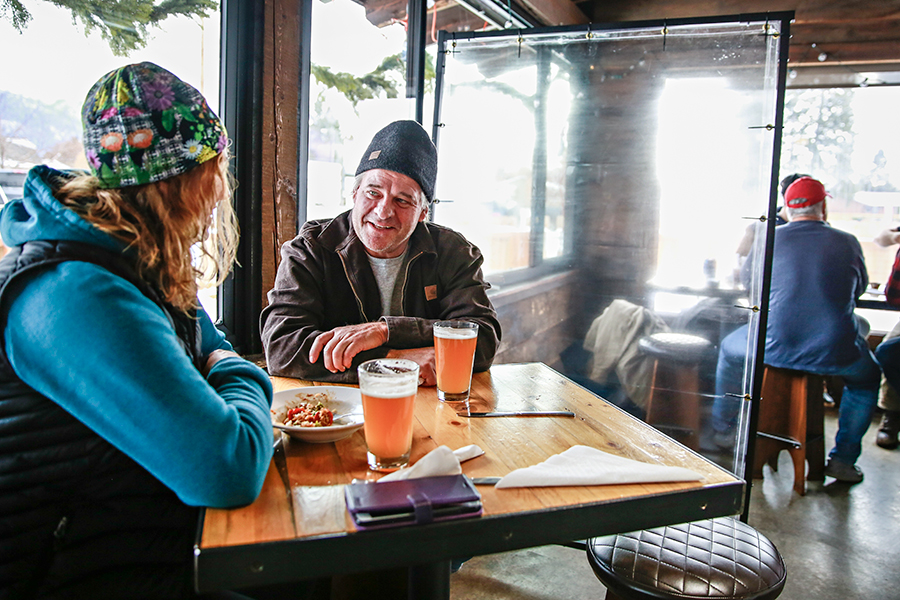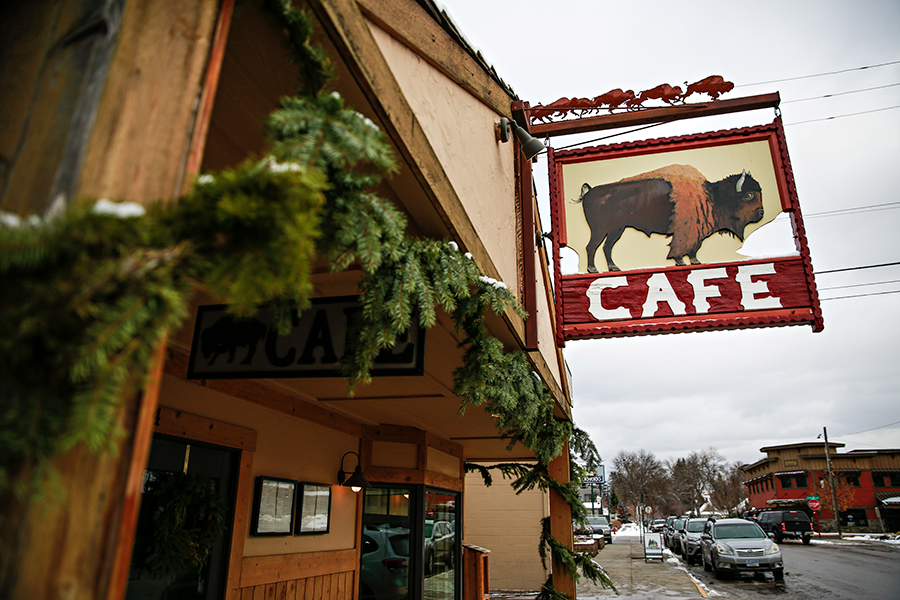2020 Business of the Year: Service Industry
Restaurants and bars navigated shutdowns, reduced capacity and adherence to health guidelines, costing them money as they prioritized the safety of workers and customers
By Andy Viano
In March, there was fear. In July, it was relief. Then came anger in the fall. And now, with a vaccine on the way and the odds increasing that the summer of 2021 will be more like 2019 and less like this past year, there is, cautiously, a bit of optimism among business owners who rely on crowded rooms, open mouths and late nights to pay the bills.
It goes without saying at this point, but 2020 was, in fact, a year no one in the service industry has seen before and that no one ever wants to experience again. It’s no secret that small businesses in particular have struggled to stay afloat with a dwindling pool of customers who feel safe enough to go out in public while mostly abiding by government public health directives that are, while necessary, bad for business.
Concern that the COVID-19 pandemic would arrive in Northwest Montana first mounted in early March, and by the end of the month the entire state was on lockdown. Restaurant and bar owners, thankfully in the middle of the slow shoulder season, shut their doors, sent their employees home and wondered when they would see them again.
“The day it felt real was that Sunday that Big Mountain closed (March 15),” Alex Maetzold, who co-owns Whitefish’s Buffalo Café, said. “That’s when you could see it ripple through the dining room and it felt like, ‘Oh crap, this is serious.’”
Maetzold described the next few weeks as “a slow-motion crash” as he and his family tried to devise a plan for keeping the business afloat and employees on the payroll as long as possible, while wondering what the future of the restaurant industry might look like.
Thankfully, a bit of clarity came on March 27 when the CARES Act was signed into law, and within weeks workers were able to apply for and receive enhanced unemployment benefits and businesses were able to access emergency funds via Paycheck Protection Program (PPP) loans. But the reality of reopening amid the pandemic forced businesses, especially restaurants and bars, to rethink how they operate.
Some, like the Stonefly Lounge in Coram, simply shut down for weeks, at least until Montana entered Phase 1 of its reopening plan and allowed restaurants and bars the option to re-open, with restrictions, on May 4. Others, like Buffalo Café and Backslope Brewing in Columbia Falls, pivoted to takeout and worked with skeleton staffs to serve customers.
Backslope co-owner Carla Fisher said the restaurant and brewery went from 46 employees per pay period to 12 during the shutdown, in part because some employees were fearful of coming to work because they were either more at-risk if they contracted the virus or lived with someone who was. Backslope also slashed its hours, moved from seven to five days a week, established online ordering, created a makeshift drive-up window and, because of a barrage of calls, added a second phone line.
The businesses interviewed for this story said that while the stay-at-home period was challenging, the PPP loans and enhanced unemployment allowed them, and their employees, to sail relatively smoothly into the summer. But the seasonality of business in Northwest Montana meant that when the typically busy months of July and August rolled around, there was a lot more on the line. To their delight, cases were down and business was booming this summer.
“June, July and August, the summer business bump was a bit of a surprise,” Stacey Schnebel, co-owner of the Stonefly, said. “We weren’t expecting regional drive business.”

Business may have rebounded but was hardly as usual inside — or outside — many establishments. Stonefly installed plexiglass separators at the bar and canceled its typically robust live music schedule. Maetzold said Buffalo Café was making “less money for twice the work” as reduced capacity combined with aggressive sanitation measures, like washing menus and pens after every visit.
On July 15, at the height of the busy tourist season, Gov. Steve Bullock issued a directive requiring face coverings be worn at all indoor establishments, and within weeks a massive political firestorm had erupted. Maetzold, Fisher and Schnebel’s establishments all complied and enforced the order from the beginning but not without pushback. All three acknowledged that they had lost customers who were unwilling to wear masks, but most believed their business may have gained just as many who were only willing to eat and drink there because the directive was being enforced, even if the constant battles with anti-mask customers were exhausting.
“I’m certain that we have lost a little business to people who prefer not to be in this type of environment,” Schnebel said. “The locals who don’t want to wear masks don’t come in; everyone else feels safer in our establishment knowing that we are doing our best to keep them safe. It’s a little bit of a beacon of normalcy that you can go to a tavern and feel like you haven’t risked your life to do so.”
At Backslope, which will celebrate its fifth anniversary in March, the going has been a little tougher since fall rolled around. Fisher decided to close to in-person guests in October in part because COVID cases had spiked in the community but also because she and her staff were sick of dealing with endless battles over masks.
“I think one of the things, being in customer service, you always want to say, ‘yes.’ You want to figure out a way to make it work,” she said. “And we have since March been having to say, ‘no.’ And having to say ‘no’ and having customers not used to us saying ‘no,’ it’s really hard.”
“I know my staff is tired of having to ask people to put their masks on, but at the same time, and our staff understands, wearing a mask is one of the things that we can do to make sure that we are still in business and our staff are still able to come to work and we can make a living.”
All three owners expressed confidence the pandemic would not put them out of business, even if 2020 won’t be a fiscal year to celebrate, and for some the necessity of adaptation led to innovation. With reduced capacity inside, Backslope now has dining — and drinking — on an outdoor patio, and Stonefly is building a new outdoor stage to go along with a food menu that debuted in September.
For now, though, Schnebel has stopped promoting the Stonefly entirely, and the now mandated statewide bar closure at 10 p.m. has hit hard. But the difficult choice of picking public health over the bottom line is one she thinks she can weather for a few more months with the end of the pandemic in sight.
“We’re going to make it but that’s because we’re managing every dollar as tightly as we can,” she said. “I’m having a hard time striking that balance and what we’re going to do to stay open until 2021 when the faucet turns back on.”